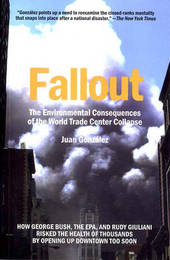
|
Fallout: The Environmental Consequences of the World Trade Center Collapse
Paperback / softback
Main Details
| Title |
Fallout: The Environmental Consequences of the World Trade Center Collapse
|
| Authors and Contributors |
By (author) Juan Gonzalez
|
| Physical Properties |
| Format:Paperback / softback | | Pages:160 | | Dimensions(mm): Height 185,Width 121 |
|
| Category/Genre | Modern and contemporary fiction (post c 1945) |
|---|
| ISBN/Barcode |
9781565848450
|
| Classifications | Dewey:363.73097471 |
|---|
| Audience | |
|---|
|
Publishing Details |
| Publisher |
The New Press
|
| Imprint |
The New Press
|
| Publication Date |
19 February 2004 |
| Publication Country |
United Kingdom
|
Description
Within days of the September 11th attack in New York City, Environmental Protection Agency Administrator Christie Whitman, together with Time Man of the Year Rudy Giuliani, reassured New Yorkers that air "contaminants are either not detectable or are below the Agency's concern levels." In fact, EPA tests taken at the time showed high concentrations of toxic materials in the air downtown, including asbestos, dioxins, and heavy metals. Con Edison and the Port Authority revealed-two months after the attack-that nearly 200,000 gallons of diesel fuel and transformer oils, much of it contaminated with low-level PCBs, had escaped beneath Ground Zero. And independent measurements of indoor air, widespread because the agency declined to test private buildings, showed astronomically higher readings. Prizewinning journalist Juan Gonzalez argues that public officials misled New Yorkers about the real dangers of toxic contamination after September 11. Their failure may have profound effects on the long-term health of New Yorkers and the reputation of the ex-mayor.
Author Biography
Daily News columnist Juan Gonzalez is one of the few journalists investigating the environmental impact of the WTC collapse. His previous books include Roll Down Your Window and Harvest of Empire.
ReviewsI am glad to reassure the people of New York . . . that their air is safe to breathe and their water is safe to drink.
|